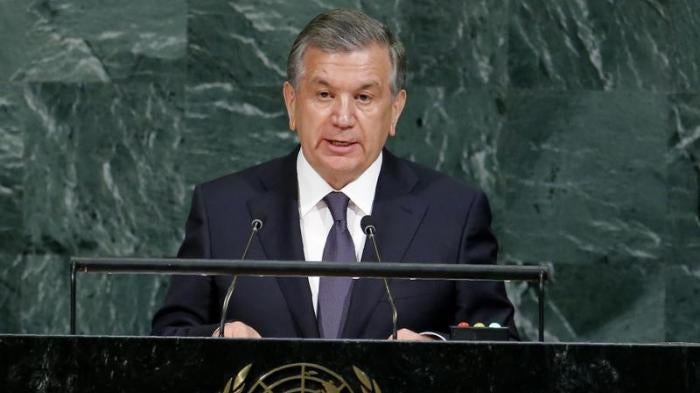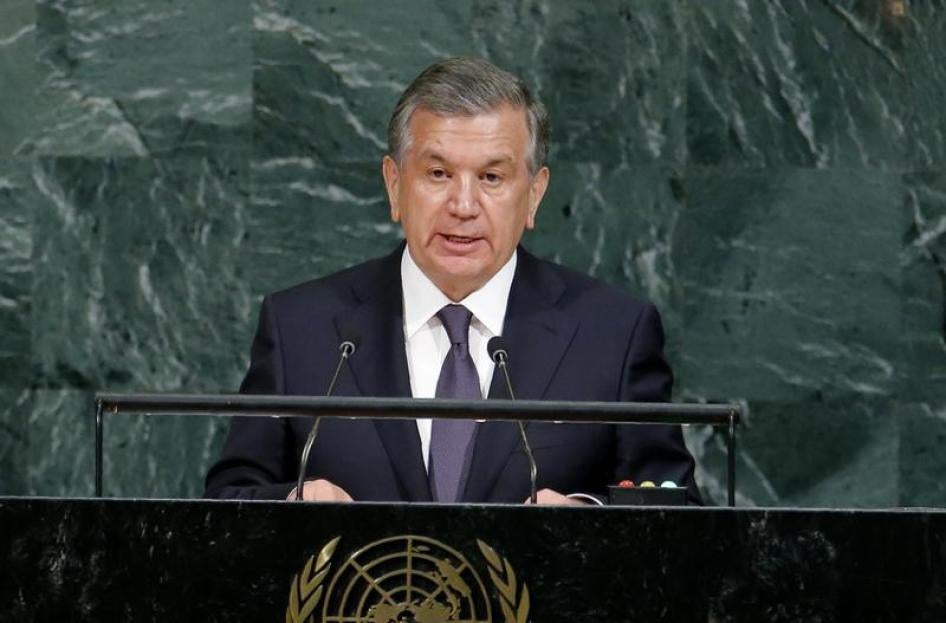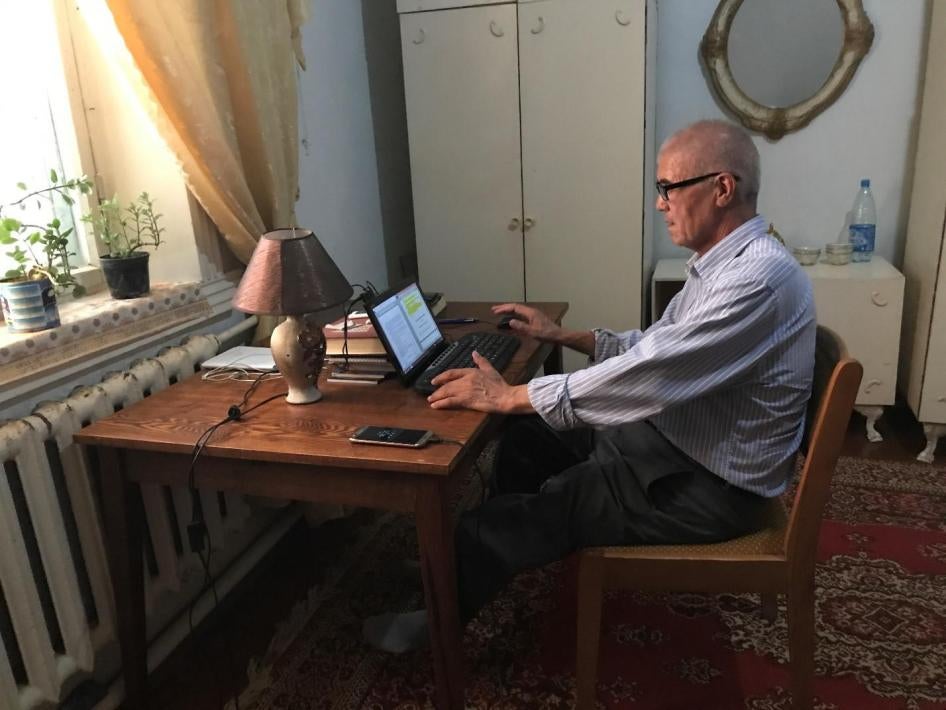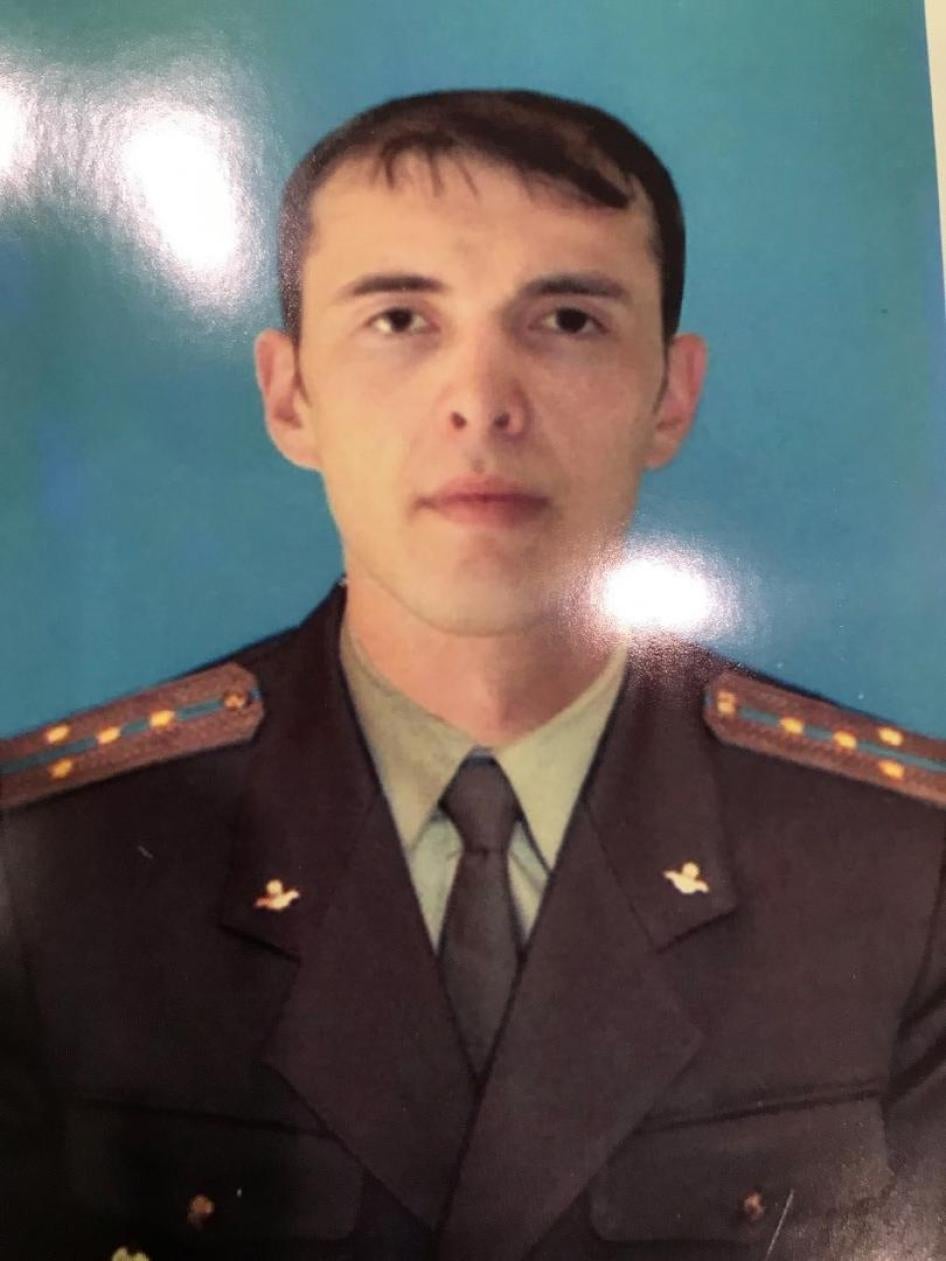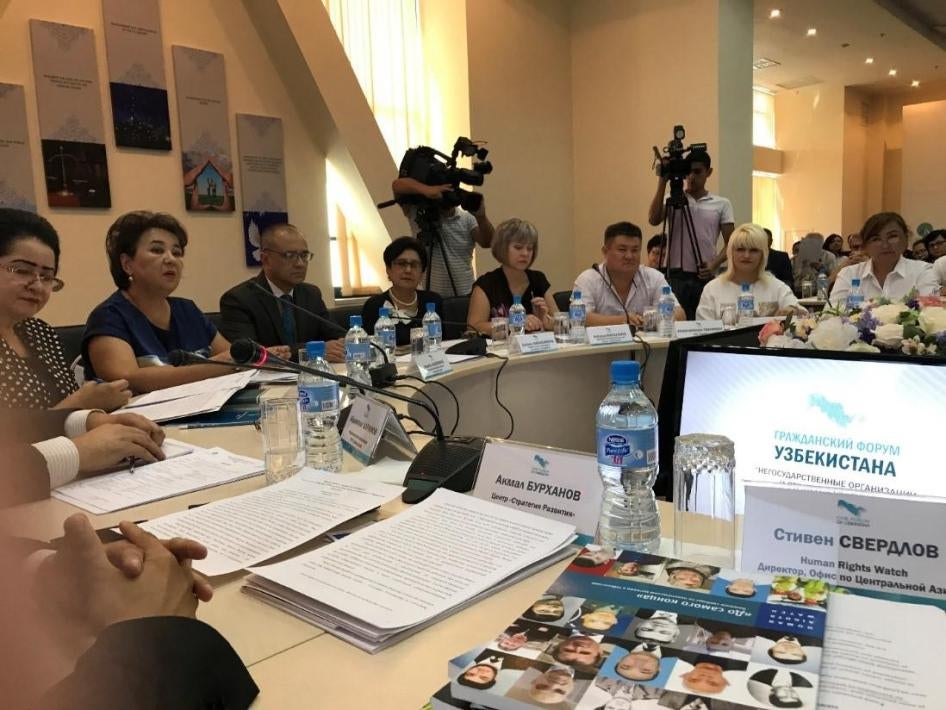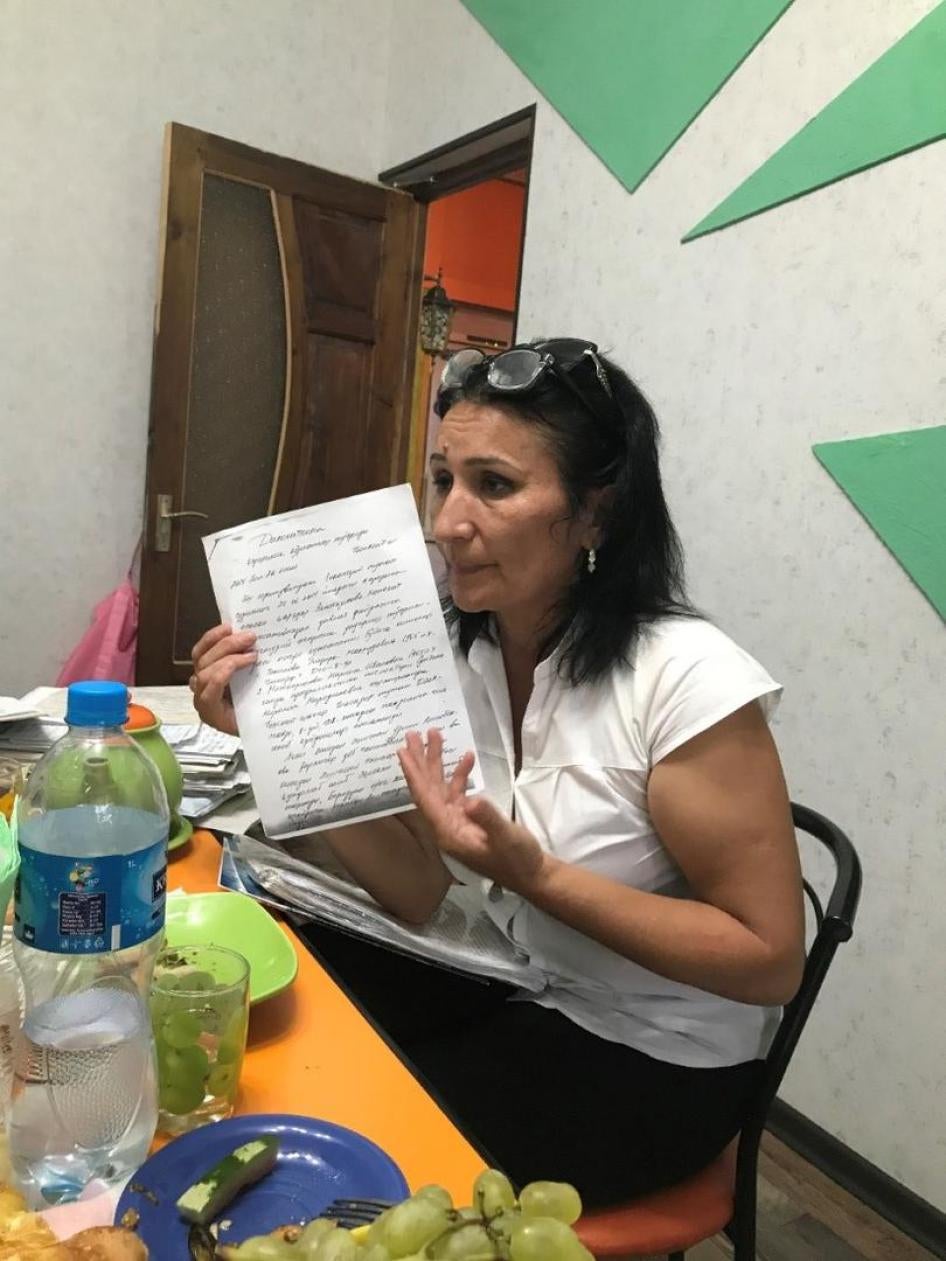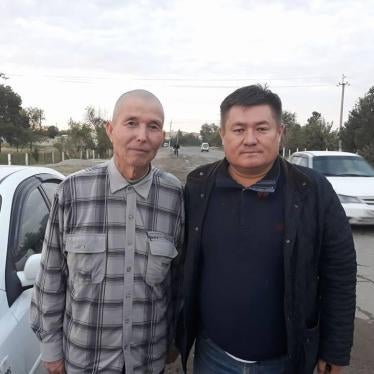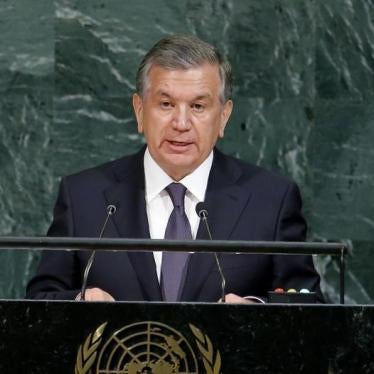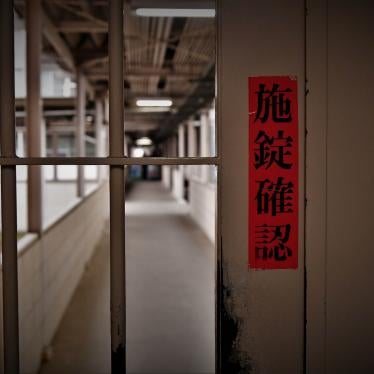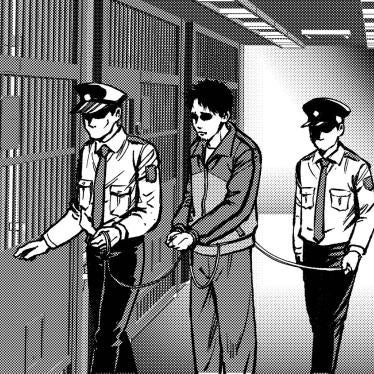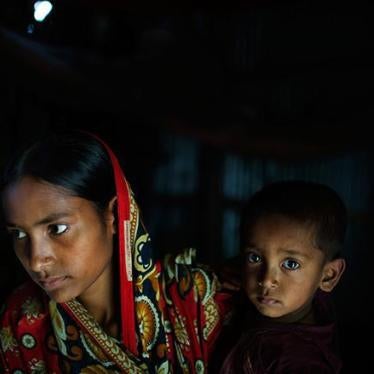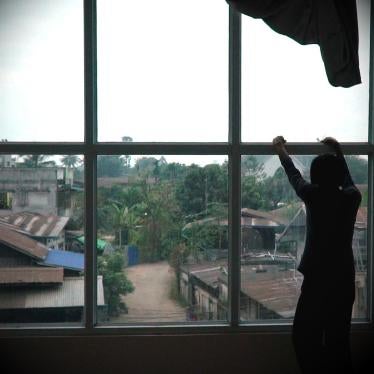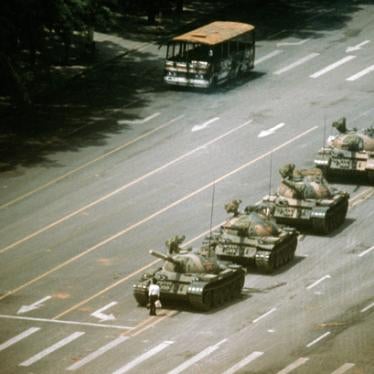(ビシュケク)― シャフカット・ミルジヨーエフ大統領就任から1年目となるウズベク政府は、人権状況を改善するために一部で前向きな取り組みを行ってきたが、今度はそれらを制度レベルでの改革および持続可能な改善に繋げるときが来ている、とヒューマン・ライツ・ウォッチは本日述べた。本報告は、ヒューマン・ライツ・ウォッチが7年ぶりに行った現地調査に基づいており、調査活動には政府関係者や市民社会活動家、元政治囚、一般市民への聞き取り調査も含まれる。
ヒューマン・ライツ・ウォッチはまた、近時のウズベキスタンの動きに関する動画も発表。2017年2月に釈放されるまで、18年近くと世界最長期間投獄されていた元政治囚のひとり、ジャーナリストのムハメド・ベジャノフ(Muhammed Bekjanov)氏のコメントも収録した。
ヒューマン・ライツ・ウォッチの中央アジア担当調査員スティーブ・スワードローは、「現時点でウズベク政府に寄せられた希望とは、全市民のための人権保護に向けて取られてきた措置の、控えめながら正しい方向に、さらなる変化を加えることだ」と指摘する。「この前向きな動きを構造的な改革へと継続させられるか、現政権にとっての試金石となるだろう。」
ミルジヨーエフ政権は、同国の新政治時代の幕開けを象徴する国際人権上の義務の履行を果たさなければならない。権利活動家やジャーナリスト、芸術家、信者など誰によるものであっても、政府の政策に対する平和的な批判が容認されるだけでなく、より開かれた民主的な社会への移行において、真に評価されるという明確なメッセージを発信すべきだ。
ヒューマン・ライツ・ウォッチは先月、政府関係者と広く会談し、数多くの市民活動家や元政治囚、現政治囚の家族、ならびに首都タシケント他の都市に住む一般市民にも聞き取り調査を行った。この調査で、ウズベク政府が人権状況改善のため前向きな措置をとってきたことが明らかになったほか、改善継続のために速やかな対策が必要とされる問題点も浮き彫りになった。
ミルジヨーエフ現大統領は、中央アジアの国で独裁的な支配を27年間続けたイスラム・カリモフ大統領(当時)の8月下旬の死を受け、2016年9月に政権の座についた。以来、ウズベク政府は少なくとも16人の政治囚を釈放し、表現の自由をめぐる規制を一部緩和、治安部隊の悪名高き「ブラックリスト」から一般市民を外し、かつ政府機関の市民に対する説明責任を強化した。また、毎年恒例だった綿花の収穫作業への教師や医師、大学生の強制動員を禁じている。
これらの動きは、ミルジヨーエフ大統領が前任者の無慈悲な負の遺産を打ち破る希望を示す一方で、依然として権威主義的なウズベキスタンの政治体制が意味のある形で改革され、拷問のまん延や政治囚の投獄、綿畑での強制労働などの重大な人権侵害を解決できるかはまだ予断を許さない。
ウズベク政府が人権状況の改善に向けて取り組むべき改革に関する提案は、主に以下の事柄についてである:恣意的な刑期延長の即時停止、真に自由な報道の確保、政治的に繊細な問題を取り扱うNGOの登録、国外への渡航に義務づけられた出国査証(ビザ)の即時廃止など。
Uzbekistan in a New Political Era: Cautious Optimism for Change
A little more than a year has passed since Uzbekistan’s second president, Shavkat Mirziyoyev, assumed power after the death of Islam Karimov, the Central Asian nation’s former authoritarian leader. Since the transition, the Uzbek government has begun to take steps to improve the country’s abysmal human rights record.
These moves – coupled with currency reforms and a foreign policy pragmatically focused on repairing relations with Uzbekistan’s immediate neighbors Kazakhstan, Kyrgyzstan, Tajikistan, and Turkmenistan – have contributed to a sense of hope in Uzbekistan about the possibility for change not witnessed in many years.
President Mirziyoyev’s conscious attempt to break with the legacy of his predecessor is probably best exemplified by the extensive network of presidential reception centers established across the country, which have the specific task of responding to individual citizens’ grievances. For instance, Gulnora Ikramova, a long-time rights defender, explained that while the centers are not addressing serious rights abuses, they have, to her knowledge, on occasion proven effective in addressing everyday social, communal, and practical issues of citizens that had long been ignored during Karimov’s reign:
Many social problems that lingered for years under Karimov have now been resolved quickly by the [presidential reception] centers. Take our neighborhood, where the streets had been dark and dangerous for years. After my call to the center, street lights have finally been installed.
Mirziyoyev has also, unlike Karimov, been willing to acknowledge the persistence of human rights abuses, even on the international stage. The president’s highly publicized National Action Strategy 2017-2021, which is invoked regularly in official discourse and slogans that are prominently displayed, includes pledges to improve public administration, strengthen protections for vulnerable segments of the population, and liberalize the economy, as well as new legislation to strengthen judicial independence.
The optimism and heightened expectations of millions of Uzbeks are palpable inside the country. But it is far from clear if Uzbekistan’s still-authoritarian government will transform the modest steps it has taken thus far into institutional change and sustainable human rights improvements. Grave abuses such as torture, politically motivated imprisonment, and forced labor in the cotton fields remain widespread.
The tension present between positive moves and steps backward was especially apparent in October when, in the span of a few weeks, Uzbek authorities released five long-time held political prisoners – journalist Solijon Abdurakhmanov, political opposition activist Muhammadali Karabaev, and human rights defenders Azam Farmonov, Ganihon Mamatkhanov, and Akzam Turgunov – while arresting author Nurullo Muhammad Raufkhon and journalist Bobomurod Abdullaev on new charges.
Politically Motivated Imprisonment, Torture, Ill-Treatment in Detention
While the Mirziyoyev administration has yet to acknowledge the existence of politically motivated imprisonment in Uzbekistan, it has since September 2016 released at least 16 people imprisoned on politically motivated charges. They are: Solijon Abdurakhmanov, Muhammad Bekjanov, Botirbek Eshkuziev, Azam Farmonov, Bahrom Ibragimov, Davron Kabilov, Muhammadali Karabaev, Samandar Kukanov, Ganihon Mamatkhanov, Erkin Musaev, Bobomurod Razzakov, Davron Tojiev, Akzam Turgunov, Rustam Usmanov, and Ravshanbek Vafoev. In March 2017, authorities also released Jamshid Karimov, an independent journalist and Islam Karimov’s nephew, from forced psychiatric treatment.
The number of prisoner releases over the past year, especially five prisoners freed over a short period in October, stands in stark contrast with the one or two prisoners released each year on average during Karimov’s reign, and signals some hope that the Uzbek government could move toward freeing thousands of political prisoners in Uzbekistan.
Musaev, a former United Nations staff member convicted of fabricated charges of espionage was granted early release 11 years into his 20-year sentence. But most of the others had already reached the end or were within one or two years of the end of their prison terms – some of which had been arbitrarily extended on bogus grounds – or were elderly or in ill-health.
Thousands of individuals imprisoned on politically motivated charges remain behind bars and many have experienced torture or ill-treatment.
Human rights activists in prison include Mehrinisso Hamdamova, Zulhumor Hamdamova, Isroiljon Kholdorov, Gaybullo Jalilov, Chuyan Mamatkulov, Zafarjon Rahimov, Yuldash Rasulov, and Fahriddin Tillaev.
Journalists in prison include Bobomurod Abdullaev, Gayrat Mikhliboev, Yusuf Ruzimuradov, and Dilmurod Saidov.
Imprisoned religious figures and other perceived government critics include Aramais Avakyan, Ruhiddin Fahriddinov, Sobir Hamidkariyev, Nodirbek Yusupov, Dilorom Abdukodirova, and Ravshan Kosimov. Kudratbek Rasulov, an opposition activist, also remains behind bars.
Prison authorities in Uzbekistan also continue to use Article 221 of Uzbekistan’s Criminal Code regarding “violations of prison rules” to arbitrarily extend the sentences of people imprisoned on politically motivated charges.
In February, authorities released Muhammad Bekjanov, one of the world’s longest imprisoned journalists. He was kidnapped in Ukraine before his arrest in 1999, and severely tortured in prison, and his sentence was arbitrarily extended in 2012 by five years. In a meeting with Human Rights Watch in September 2017 at his home in northwestern Uzbekistan, Bekjanov described some of the torture he and other prisoners, including the currently imprisoned journalist Yusuf Ruzimurodov, suffered shortly after his kidnapping in Ukraine in 1999 and transfer back to Tashkent:
We arrived in Tashkent still blindfolded on the airplane, and (I noticed later) the skin on my arms was turning black from the handcuffs which almost cut through the bone they were on so tight. We were immediately taken to the Ministry of Internal Affairs basement, where the officers began beating our legs with rubber truncheons. They beat us all the time from the evening until the morning, only pausing for 5 or 10 minutes at a time. They broke my right leg, and when they got tired of beating my legs they beat other areas. After three days of that I could no longer walk and could not bear the beatings any further. This went on daily for at least a month and a half, as the officials tried to force me to make a false confession. When I refused they would beat me harder. They beat me so hard that I forgot the names of my own daughters.
Erkin Musaev, another former political prisoner, suffered harrowing torture in pretrial detention. He told Human Rights Watch in September 2017:
Often, they would prevent us from sleeping for no reason, coming into my cell at 5 a.m. and forcing me to ‘take a jog’ in the prison compound in the freezing cold. At times, they [prison guards] doused me with freezing cold water and then let me freeze. On another occasion, I was placed into an extremely cold, closed cell for 10 days straight.
The Uzbek government has also yet to fulfill the longstanding recommendation of UN bodies to close the Jaslyk prison colony – a detention facility long associated with some of the most egregious torture cases. Authorities continue to send people imprisoned on politically motivated charges there, including rights defender Azam Farmonov, until his release in early October.
Judicial Reform, Torture, and the Independent Legal Profession
The Uzbek government has emphasized judicial reform as a priority under the National Action Strategy and has adopted two recent presidential decrees – one in October 2016 and the other in February 2017 – designed to increase independence of the judiciary. In February, the government introduced a new institution – the Supreme Judicial Council – a body of the judiciary that, among other things, appoints, supervises, and disciplines or dismisses judges working in courts below the Constitutional and Supreme Courts and several other key courts. The decrees also put in place a system under which judges may gradually move to tenured appointments, increasing their independence from the executive branch.
While the extent to which these measures will improve citizens’ experience of justice in the court system remains to be seen, they have edged Uzbekistan’s judicial practices more closely in line with international standards outlined in the UN Basic Principles on the Independence of the Judiciary. Another amendment introduced in April reduced the time arrestees could be held in pretrial detention prior to a court hearing, from 72 to 48 hours, fulfilling a long-standing recommendation by the UN Human Rights Committee and the Committee against Torture.
These initiatives are important, not least because torture has been rampant in Uzbekistan and occurs with near-total impunity. Forum 18, a non-governmental organization that monitors religious freedom, recently reported a torture case in the northwestern city of Nukus, where police officers jailed a Jehovah’s Witness, hitting him “on his kidneys, chest, stomach, and face. They then demanded that he do 150 squat exercises without taking a rest. When he was able to do only 120, the officers again beat him in the face.” Later, police “kicked him on the back” and subsequently “[in freezing conditions] poured cold water on the floor of the cell and kicked him in the head.”
In September, lawyers reported to Human Rights Watch that the rights of detainees are routinely violated at each stage of investigations and trials, despite habeas corpus amendments that went into effect in 2008. Suspects are often not permitted meaningful access to lawyers, and police use torture to coerce confessions from detainees. Authorities routinely refuse to investigate allegations of abuse. Uzbek authorities will need to take demonstrable and verifiable action to end this situation and hold those responsible to account.
Since 2013, the International Committee of the Red Cross (ICRC) has not carried out independent monitoring of Uzbekistan’s prisons and places of detention. In 2013, ICRC announced its suspension of its monitoring programs due to an inability to conduct prison visits and confidential meetings with prisoners free of government interference. In meetings with Human Rights Watch in September, Uzbek government officials acknowledged the importance of the ICRC’s monitoring role, indicating an openness to the organization resuming its work. Officials also said that ratification of the Optional Protocol to the Convention against Torture (OPCAT), is currently under consideration.
The government has also increased the independence of Uzbekistan’s Ombudsman for Human Rights, Ulugbek Muhammadiyev, appointed just two years ago. An August 2017 law enables the Ombudsman’s Office to intervene on behalf of citizens in various legal cases as a pro bono public defender, and the provision of an independent line-item for the ombudsman’s activities in Uzbekistan’s state budget increases the office’s independence from other executive branches of government. The August 2017 law brought the powers of the human rights ombudsman closer into line with the UN “Paris Principles” that relate to the status and functioning of national institutions for the protection and promotion of human rights.
In September, Ombudsman Muhammadiyev told Human Rights Watch about his office’s increasing efforts to conduct unannounced monitoring visits of prisons across Uzbekistan and to create more opportunities for citizens to meet with his office and lodge appeals. Such efforts are important and positive, but Human Rights Watch also learned of efforts by prison officials, as recently as April 2017, to intimidate prisoners during the ombudsman’s prison visits, and of more systematic efforts to confiscate the written appeals prisoners prepare and attempt to send to his office and other government officials. Erkin Musaev, a political prisoner released in August, told Human Rights Watch about his experience when the ombudsman visited his prison, the Bekobod prison colony, in April 2017:
Ten minutes before the ombudsman’s arrival they lined up prisoners for our cellblock. They asked two of them to step forward and beat them up brutally in front of all of us. ‘Just try to complain about our prison to the ombudsman when he comes,’ they said, ‘and you’ll see what happens to you.’ Other prisoners who attempted to see the ombudsman were ‘re-directed’ to the warden’s office and kept there until after the ombudsman had left. They set out special food items and cleaned the prison before he came and then to compensate for the money spent fed the prisoners stale meat for the next week. After that experience, I wrote a letter to the ombudsman pleading with him not to come back to our prison.
Lawyers also told Human Rights Watch that a 2009 law that restructured the legal profession and abolished the previously independent bar associations, subordinating their replacement to the government, continues to severely restrict the independence of lawyers. Under the new law, all lawyers were required to re-apply for their licenses and to re-take a bar examination every three years. In the eight years since, several lawyers who consistently take on politically sensitive cases or raise allegations of torture have been disbarred, or otherwise left the profession and there has been a chilling effect on those who remain licensed to practice.
Cooperation with UN Institutions
The UN High Commissioner for Human Rights, Prince Zeid Ra’ad Al Hussein, visited Uzbekistan in May 2017 – the first ever such visit by a high commissioner for human rights to Central Asia – signaling a willingness on the part of authorities to engage more closely with UN human rights bodies. Also, in October 2017, the UN special rapporteur on freedom of religion or belief made an official visit to Uzbekistan, the first such visit by a UN human rights thematic mandate holder to Uzbekistan in 15 years.
During Hussein’s visit, Tashkent agreed to resume cooperation with the high commissioner’s regional office in Bishkek. In public comments Hussein commended Mirziyoyev for his stated commitment to reforms and urged him to follow through on releasing wrongfully imprisoned activists, cooperate with UN human rights monitors, end forced labor, and lift restrictions on media. Later, the Uzbek government announced it would allow a permanent representative of the Office of the High Commissioner for Human Rights to be based in Tashkent. There are 13 other UN mandate holders with outstanding requests to visit Uzbekistan who have been refused access since 2002, including the special rapporteurs on torture, the situation of human rights defenders, and the independence of lawyers and judges.
In his speech to the UN General Assembly in September 2017, Mirziyoyev seemed determined to move on from Karimov’s legacy, expressing the goal to build “a democratic state and a just society” where “human interests come first.” Mirziyoyev added: “We are deeply convinced that people must not serve government bodies, rather government bodies must serve the people.”
Civil Society
In contrast to the situation under Karimov, the Mirziyoyev administration has slightly relaxed restrictions on the holding of modest peaceful demonstrations, such as those by the small group of activists who make up the Human Rights Alliance of Uzbekistan, headed by veteran rights activist Elena Urlaeva. But critical voices, including independent rights activists, journalists, and lawyers, are still largely suppressed.
Civil society in Uzbekistan continues to operate under tight restrictions, and no independent domestic human rights organization has been allowed to register since 2003. Additionally, a June 2015 law strictly regulates the activities of nongovernmental organizations, requiring an onerous and burdensome process of receiving prior approval from the Ministry of Justice by at least 20 days before conducting virtually any activity. Many local and international nongovernmental organizations have reported that the June 2015 law has seriously hindered their ability to operate.
Government officials in September reported the existence of thousands of nongovernmental organizations in the country, but offered no information on attempts by the Ministry of Justice to invite activists and groups who work on politically sensitive or critical civil and political issues to gain legal registration. In contrast, one long-time human rights activist whose name is being withheld for security reasons and whose organization monitors religious freedom and civil and political rights reported that he had attempted to obtain registration unsuccessfully for seven years and had still been unable to do so in the year since Mirziyoyev assumed the presidency.
By contrast, civil society groups that work on social and economic issues appear to have greater flexibility to operate within strict regulations set by authorities. There were also tentative signs the space for broader nongovernmental organization activity could widen. In September, Human Rights Watch had contact with a range of nongovernmental organizations working on women’s rights, environmental issues, and the rights of people with disabilities, and heard from NANNOUZ, an nongovernmental organization umbrella association, about work to support people living with HIV/AIDS. Still, one nongovernmental organization working on socio-economic issues said it still faced intimidation by authorities.
In March, authorities forced long-time rights activist Elena Urlaeva to stay in a psychiatric hospital for nearly a month in retaliation for her work. Authorities detained her again in October, this time with the photojournalist Timur Karpov as they tried to monitor conditions for laborers in Uzbekistan’s cotton fields.
Mirziyoyev announced in August that the country’s exit visas – a Soviet relic that authorities have used as a tool to prevent a wide array of perceived critics, including artists and activists, from foreign travel – would be abolished in January 2019.
Media Freedom
While the media sphere remains highly controlled, in July a new 24-hour news channel, Uzbekistan 24, featured criticism of Karimov’s economic and social policies. Earlier in 2017, Uzbekistan 24 began regular broadcasts of talk shows on topical issues, including social and economic and social, concerns, and but at times more sensitive subjects such as on child labor in the cotton sector. For a brief period, these programs were broadcast live, but this ended abruptly in August, although broadcasts of recorded versions of the shows continues. Local media outlets such as kun.uz have acquired a reputation for more critical reporting.
The Uzbek government has made overtures to international media, giving access to a reporter from the Wall Street Journal, hosting an Organization for Security and Cooperation in Europe (OSCE) media forum in October that included several journalists, and inviting others to upcoming international conferences. The government announced in June that the BBC’s Uzbek service would be allowed to base a correspondent in Tashkent, although accreditation has not yet been issued. In the past year, however, other reporters from international outlets, such as the German reporter Edda Schlager, have been detained during their reporting trips.
On September 27, Uzbek security services detained Bobomurod Abdullaev, an independent journalist, in Tashkent, on what appears to be a politically motivated charge. He was charged with “attempts to overthrow the constitutional regime” under Article 159 of Uzbekistan’s Criminal Code, and faces up to 20 years in prison. He remains in custody.
On the same day, police also detained Nurullo Muhummad Raufkhon, an Uzbek author, at Tashkent airport, after he arrived from Turkey following two years of exile. He was charged with extremism for his book Bu Kunlar (These Days), which criticizes Karimov. He was released on October 1, but still faces charges.
To date, the internet in Uzbekistan is highly censored, with access blocked to many critical websites, including independent media such as Fergana News, Radio Free Europe’s Uzbek service, and other sources of news.
Freedom of Religion
Since the late 1990s Uzbekistan has maintained some of the world’s most restrictive policies on the exercise of worship or belief. Authorities highly regulate religious worship, clothing, and sermons delivered by the country’s imams, and ban all forms of proselytism. Peaceful religious believers are often branded “religious extremists.”
Following his two-week visit to Uzbekistan this month, the UN special rapporteur on freedom of religion or belief summarized his findings that while Uzbek laws theoretically guarantees freedom of religion, in practice religious practice is subject to “excessive regulations that prioritize security over freedom,” with the government’s approach promoting “toleration instead of freedom.” He said that “[w]hat is required is not just the adoption of new laws, but also meaningful institutional reform, and credible change on the ground.”
The government has for many years maintained a “black list” – made up of thousands of individuals suspected of belonging to unregistered or extremist groups. Those on the list are barred from obtaining various jobs and travel, and must report regularly for police interrogations.
In August 2017, authorities announced a reduction of the number of people on the “black list” from 17,582 to 1,352, softening certain religious freedom restrictions. In public remarks accompanying the move, President Mirziyoyev emphasized the need to rehabilitate citizens who had been “misled” by radical groups.
Despite this positive move, thousands of religious believers – religious Muslims who practice their religion outside strict state controls – remain imprisoned on vague charges of extremism. In May, authorities convicted 11 Muslims on extremism charges that appeared fabricated. Surat Ikramov, a human rights activist, said the charges were bogus, that the men only “ate, rested, and prayed together,” and that the men’s confessions were procured through torture.
Followers of the late Turkish Muslim theologian Said Nursi are prosecuted for religious extremism. Hundreds of Nursi followers have been arrested or imprisoned in the last decade. Authorities harass Christian communities. In April, a court in the northwestern Karakalpakstan autonomous region imposed short prison terms on four Protestant men – Marat, Joldasbai, Atamurat, and Salamat. Judge Sailaubai Mambetkadyrov of the Criminal Court in Nukus, Karakalpakstan’s regional capital, handed down the 15-day prison terms to punish them for meeting for worship in a home.
Authorities continue to arbitrarily extend sentences of religious prisoners for alleged violations of prison regulations. Such extensions occur without due process and can add years to a prisoner’s sentence, raising concerns that the practice appears designed to keep religious prisoners behind bars indefinitely.
For example, as reported by Forum 18, imprisoned rights defender and religious believer Mehrinisso Hamdamova was sentenced on politically motivated charges of extremism to seven years in April 2010. She was due to be released in November 2016 but, despite suffering from a myoma (a tumor associated with uterine cancer), was given an additional three-year prison term. In August 2016, her sister Zulhumor who had been due for release in May 2016, had her prison term extended by three years for alleged violation of prison rules. Both sisters’ health has long caused serious concern, and authorities have denied them medical treatment.
Forced Labor in the Cotton Fields
For years the Uzbek government has forced Uzbek citizens, including education and health workers, students, and people receiving public benefits, to pick cotton for the state-run cotton industry involuntarily and under the threat of penalty, such as dismissal or expulsion from their jobs or loss of benefits.
In September 2017, the Uzbek government recalled university students and some health and education workers from forced labor in the cotton fields. But other workers remained involuntarily in the fields or faced extortion to pay for workers to replace them if they left. On September 21, 2017, Prime Minister Abdulla Aripov ordered officials to recall students and education and medical workers, who had been picking cotton under threat of penalty since the harvest began on September 10, despite an August degree banning the recruitment of such workers.
Bringing students home from the fields is a significant change and shows the importance of political will in ending forced labor. Now it is crucial for Uzbekistan’s international partners, including the United States, European Union, other states, and international financial institutions, to urge the government to allow all involuntary workers to return from the fields without penalty – including being required to pay for someone else to work in their place – and to monitor and publicly report on findings.
Mirziyoyev addressed forced labor in his speech to the UN General Assembly. It was the first time an Uzbek president acknowledged the issue on the international stage, after a decade of international pressure from governments and other stakeholders and campaigning by the Cotton Campaign – a global coalition of human rights, labor, investor, and business organizations dedicated to eradicating child labor and forced labor in cotton production. Forced labor was raised again in a meeting with the World Bank president, Jim Yong Kim, on September 20.
These significant developments show that Uzbekistan can end the decades-long practice of mobilizing massive forced labor to harvest cotton. But these positive steps should not obscure the persistence of forced labor in the current cotton harvest or the continuing threats against activists trying to monitor the situation. The Uzbek government should follow these steps with meaningful reforms to end this repressive and exploitative form of production once and for all.
Preliminary monitoring by independent monitors in September and October shows that teachers and health care workers in some districts were recalled, but workers in other districts were not. Interviews with independent monitors revealed that even as workers are being brought back from the fields, some local officials are extorting funds from businesses and individuals to pay for “replacement” workers. In some areas, returning teachers were made to pay about US$40, half their monthly wage, to hire a replacement worker.
In the Fergana region, officials told business owners that refusal to participate in the collection would be tantamount to an “anti-state action” that would result in a visit from the tax inspector. Most independent monitors continue to work in secret because authorities carried out multiple arrests and even physical assaults on monitors during the 2015 and 2016 harvests.
Independent monitors told Human Rights Watch in September 2017 that in various regions, such as Bukhara, public sector workers were forced to sign forms that they would “voluntarily” pick cotton. Human Rights Watch also learned of instances, such as in the Parkent district of the Tashkent region, where authorities forced teachers and medical personnel to conceal their actual professions when signing up to participate in the harvest.
For the third year in a row, the International Labour Organization (ILO) has contracted with the World Bank, which has invested more than US$500 million in projects that benefit agriculture, to monitor forced and child labor in World Bank project areas. A recent letter from the American Apparel & Footwear Association (AAFA) expressed serious concern regarding the ILO’s monitoring methodology and recommended improvements in its mandate during the 2017 harvest.
All stakeholders, including the ILO and the World Bank, should closely monitor the situation on the ground from the harvest, including information provided by nongovernmental monitors, and judge progress toward eliminating forced labor in terms of how that reality matches the president’s statements.
Recommendations
This is a real moment of hope for the human rights of the Uzbek people. The key is for the Uzbek government to transform the modest steps it has taken thus far into institutional change and sustainable improvements. The Uzbek government should consolidate the country’s new political era by acting to fulfil its international human rights obligations.
Mirziyoyev’s government should send an unambiguous message that peaceful criticism of government policies – whether by human rights activists, journalists, artists, or religious believers – is inherently valued and useful in Uzbekistan’s transition to a more open and democratic political era. The following are specific recommendations Human Rights Watch urges the Uzbek government to take to improve the human rights situation:
- Immediately and unconditionally release all wrongfully imprisoned human rights defenders, journalists, members of the political opposition, and other activists held on politically motivated charges;
- End the practice of arbitrarily extending prison sentences for minor offenses or “violations of prison rules” under article 221 of the criminal code;
- Take meaningful measures to end torture, implementing in full the recommendations of the UN special rapporteur on torture, the UN Committee Against Torture, and the UN Human Rights Committee, including closure of the Jaslyk prison colony, the resumption of prison monitoring by the International Committee of the Red Cross (ICRC), and the ratification of the Optional Protocol to the Covenant against Torture (OPCAT);
- Ensure genuine media freedom, end censorship of the internet, cease harassment of journalists, and allow domestic and international media outlets, including those that have been forced to stop operating in Uzbekistan, to register, and grant accreditation to foreign journalists;
- Allow domestic and international human rights organizations to operate without government interference, including by promptly re-registering those that have been liquidated or otherwise forced to cease operating in Uzbekistan;
- Repeal the June 2015 law which imposes on nongovernmental organizations the onerous and burdensome process of receiving prior approval from the Ministry of Justice for a variety of activities;
- Immediately abolish the system of exit visas required for Uzbek citizens to travel abroad;
- End religious persecution, including by decriminalizing peaceful religious activity, and ending the imprisonment of thousands of people for their nonviolent religious expression;
- Build on the visit by the UN special rapporteur on freedom of religion in October 2017, issue invitations to the remaining 13 UN monitors who have asked to visit Uzbekistan, and implement recommendations by independent monitoring bodies, including UN treaty bodies and special procedures;
- Effectively end forced labor of adults in the cotton sector, implement fully government decrees banning the mobilization of public sector workers and students, allow independent nongovernmental organizations and activists to conduct their own monitoring without harassment; and
- Ensure accountability for the 2005 Andijan massacre, during which government forces shot and killed hundreds of mostly peaceful protesters, and cease harassment and other abuses of refugees who returned to Uzbekistan after leaving the country following the massacre, and of families of refugees who remain abroad.
